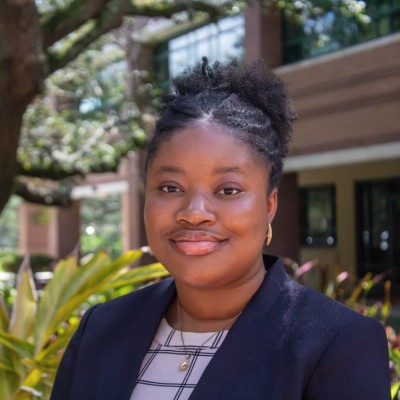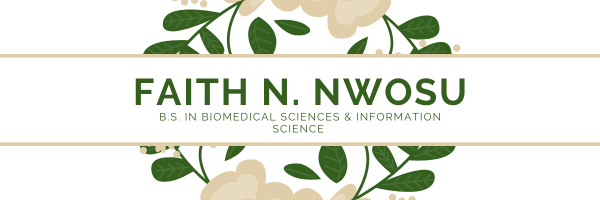About Me

Extended Bio
Information Science is a broad and interdisciplinary field of study that examines how information is created and shared, in both macro- and microscopic capacities (Given et al., 2023). The field tends to intersect with other fields such as psychology, sociology, data science, and more. The versatility of this subject is what drew me to pursuing a Bachelor of Science degree in Information Science (also known as BSIS). The skills that I have learned as a BSIS student are vast, and I am thankful for their application in my personal and academic career. My name is Faith Nwosu. I am a senior at the University of South Florida, double majoring in Biomedical Sciences and Information Science, with a concentration in Health Informatics. I am a Tampa native who has spent her entire life intrigued by cognitive science and its application in the medical field. To further deepen my knowledge, I am currently pursuing a career in psychiatry as a physician and hope to eventually use the knowledge that I have learned in both my Biomedical Science and Information Science degrees to further improve health outcomes. In my Information Science courses (such as Intro to Programming, Intro to Data Science, Clinical Decision Support Systems, etc.) I have learned the basics of coding languages such as Python, R, and Java. I have also used decision tree software such as See5 to determine health outcomes (such as diagnostic decision making).
Over the course of my undergraduate career, I have obtained a certification in basic CPR from the American Heart Association, certification in Community Health Information Specialization from the Medical Library Association, and training on how to handle human subjects in behavioral research from the CITI Program. Relating to my certifications, I am currently a research assistant within USF’s School of Music. I am the project lead of a study that is being conducted to determine the effects of a music and visual arts program on children’s memory performance and cognition. This is the research project that I have worked on for most of my undergraduate career, and it has taught me a lot about the intersections of music and information processing. I also completed an Honors Thesis under the School of Information. My thesis topic was on the patient-provider interactions within the Nigerian healthcare system, and how stronger digital infrastructure can be adapted to further strengthen these relations. Both of these research pursuits have further confirmed my passion for learning about the psychiatric field. To pursue a doctoral degree in psychiatry, this requires admission into medical school. In order to enter medical school, one must complete the Medical College Admissions Test (MCAT; American University of the Caribbean School of Medicine, 2025). I initially took the exam in May of 2025. However, I plan to retake this exam to further strengthen my medical school application. Some other requirements needed for medical school admission include: a plethora of extracurriculars that demonstrate community service and research, a well-balanced course load of STEM and non-STEM courses, a strong GPA (generally a 3.5 out of 4.0 and higher is recommended). After completing four years of medical school, a new graduate must then apply to psychiatric residency programs, which also require a strong academic profile, and completion of the STEP exams. The average income of a psychiatrist in the United States is $256,930 as of 2023 (Bureau of Labor Statistics, 2023). Currently, psychiatry is in need of stronger access to care. There is a stigma associated with psychiatry, due to negative experiences people may have with certain providers (i.e. providers not fully addressing patient’s needs, dismissing the socioeconomic factors that may impact patient’s care, etc.). Because of this, stronger emphasis on the “soft skills” needed for the field (such as compassion, strong work ethic, teamwork, etc.) can lead to better patient-provider relations. The journey that I have elected to pursue will be long; this is a life-time commitment to education. However, I am not deterred by the length of the journey, as my previous experiences have shaped me into the person I am today. Information Science as a field has shaped me for the better, as I am now more cognizant of my interactions with new information and its application.